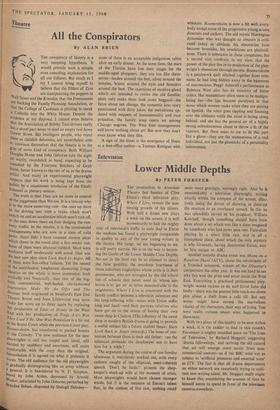Television
Lower Middle Depths
By PETER FORSTER
THE production in Armchair Theatre last Sunday of Clive Exton's third television play, Where I Live, reveals the con- tinuing growth of his talents. With half a dozen new plays a week on the screen, it is well momentarily to halt the mighty roar of television's traffic to note that in Exton the medium has found a playwright comparable in quality to any of the new young writers in the theatre. His range, we are beginning to see, is still pretty narrow. He is on the way to becom- ing the Gorki of the Lower Middle Class Depths. No ear in the land can be so attuned to detect the false gentility, the overdone heartiness of those suburban troglodytes whose pride is in their pretensions, who are strangled by the old school ties of schools they never went to, whose am- bition is to `get on' in terms demonstrable to the neighbours. Where I Live is concerned with the family conflict between a television salesman and .his long-suffering wife--wives with Exton suffer long and hard—and their parvenu relatives who have got on to the extent of having their own sweet shop in Clacton. (The influence of the sweet shop in modern British drama is going to provide a useful subject for a future student thesis: from Look Back in Anger onwards.) The bone of con- tention between them is their old father : can the salesman persuade the shopkeeper son to have him for a while?
The argument during the course of one Sunday afternoon is mercilessly worked out, with every cadence caught of the elliptical, semi-coherent speech. 'Don't be futile!' protests the shop- keeper's stuck-up wife at the moment of crisis. Most playwrights would have chosen stronger words, but it is the measure of Exton's talent that, in the context of this row, nothing could
seem more gratingly, searingly right. Also he Is unmistakably a television playwright, writing exactly within the compass of the screen, effec- tively using the device of showing in close-up the reaction to an overheard remark. In this he was splendidly served by his producer, William Kotcheff, though something should have been done about a set which was like a slum imagined by somebody who had never seen one. First-class playing by a select little cast, and in all a triumphant piece, about which the only mystery is why Granada, having discovered Exton, ever let him escape to ABC.
Another notable drama event was Moon on a Rainbow Shawl (ATV), about the inhabitants of a Trinidad tenement, winner of the Observer's competition the other year. It was not hard to see why this won the prize and never made the West End. Everything a practised professional play- wright would reckon to do well Errol John did badly—there was the poorest little reach-me-down plot about a theft from a cafd till. But any writer might have envied the marvellous vitality of the characters, their way of living. You were really curious about what happened to them next.
With two plays of this quality to be seen within a week, it is the sadder to find in this month's Encounter a mighty muddled piece on 'The Uses of Television,' by Richard Hoggart, suggesting 'drama fellowships,' and reviving the old canard that art will emerge more surely from non- commercial sources—as if the BBC were not as subject to 'artificial pressures and external aims' as ITV. The fact is that all drama departments on either network are ceaselessly trying to culti- vate new writing talent. Mr. Hoggart really ought to know this, considering the amount of time he himself seems to spend in front of the television cameras nowadays.


































 Previous page
Previous page